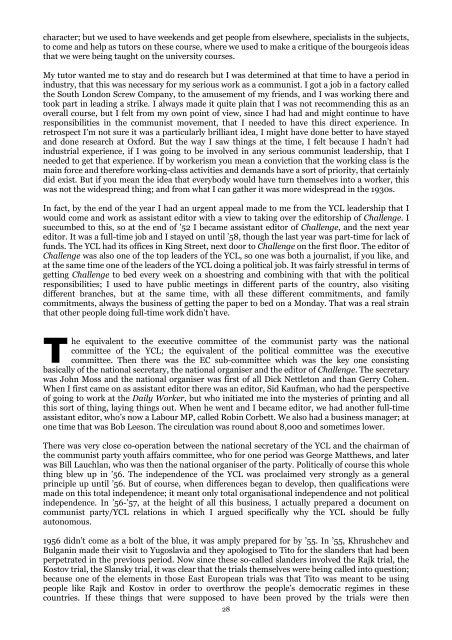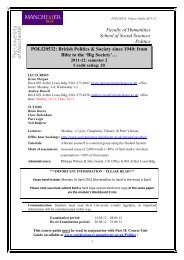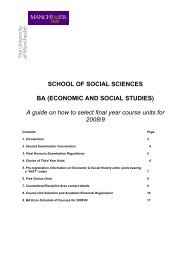CHNN 22, Spring 2008 - School of Social Sciences
CHNN 22, Spring 2008 - School of Social Sciences
CHNN 22, Spring 2008 - School of Social Sciences
You also want an ePaper? Increase the reach of your titles
YUMPU automatically turns print PDFs into web optimized ePapers that Google loves.
character; but we used to have weekends and get people from elsewhere, specialists in the subjects,<br />
to come and help as tutors on these course, where we used to make a critique <strong>of</strong> the bourgeois ideas<br />
that we were being taught on the university courses.<br />
My tutor wanted me to stay and do research but I was determined at that time to have a period in<br />
industry, that this was necessary for my serious work as a communist. I got a job in a factory called<br />
the South London Screw Company, to the amusement <strong>of</strong> my friends, and I was working there and<br />
took part in leading a strike. I always made it quite plain that I was not recommending this as an<br />
overall course, but I felt from my own point <strong>of</strong> view, since I had had and might continue to have<br />
responsibilities in the communist movement, that I needed to have this direct experience. In<br />
retrospect I’m not sure it was a particularly brilliant idea, I might have done better to have stayed<br />
and done research at Oxford. But the way I saw things at the time, I felt because I hadn’t had<br />
industrial experience, if I was going to be involved in any serious communist leadership, that I<br />
needed to get that experience. If by workerism you mean a conviction that the working class is the<br />
main force and therefore working-class activities and demands have a sort <strong>of</strong> priority, that certainly<br />
did exist. But if you mean the idea that everybody would have turn themselves into a worker, this<br />
was not the widespread thing; and from what I can gather it was more widespread in the 1930s.<br />
In fact, by the end <strong>of</strong> the year I had an urgent appeal made to me from the YCL leadership that I<br />
would come and work as assistant editor with a view to taking over the editorship <strong>of</strong> Challenge. I<br />
succumbed to this, so at the end <strong>of</strong> ’52 I became assistant editor <strong>of</strong> Challenge, and the next year<br />
editor. It was a full-time job and I stayed on until ’58, though the last year was part-time for lack <strong>of</strong><br />
funds. The YCL had its <strong>of</strong>fices in King Street, next door to Challenge on the first floor. The editor <strong>of</strong><br />
Challenge was also one <strong>of</strong> the top leaders <strong>of</strong> the YCL, so one was both a journalist, if you like, and<br />
at the same time one <strong>of</strong> the leaders <strong>of</strong> the YCL doing a political job. It was fairly stressful in terms <strong>of</strong><br />
getting Challenge to bed every week on a shoestring and combining with that with the political<br />
responsibilities; I used to have public meetings in different parts <strong>of</strong> the country, also visiting<br />
different branches, but at the same time, with all these different commitments, and family<br />
commitments, always the business <strong>of</strong> getting the paper to bed on a Monday. That was a real strain<br />
that other people doing full-time work didn’t have.<br />
T<br />
he equivalent to the executive committee <strong>of</strong> the communist party was the national<br />
committee <strong>of</strong> the YCL; the equivalent <strong>of</strong> the political committee was the executive<br />
committee. Then there was the EC sub-committee which was the key one consisting<br />
basically <strong>of</strong> the national secretary, the national organiser and the editor <strong>of</strong> Challenge. The secretary<br />
was John Moss and the national organiser was first <strong>of</strong> all Dick Nettleton and than Gerry Cohen.<br />
When I first came on as assistant editor there was an editor, Sid Kaufman, who had the perspective<br />
<strong>of</strong> going to work at the Daily Worker, but who initiated me into the mysteries <strong>of</strong> printing and all<br />
this sort <strong>of</strong> thing, laying things out. When he went and I became editor, we had another full-time<br />
assistant editor, who’s now a Labour MP, called Robin Corbett. We also had a business manager; at<br />
one time that was Bob Leeson. The circulation was round about 8,000 and sometimes lower.<br />
There was very close co-operation between the national secretary <strong>of</strong> the YCL and the chairman <strong>of</strong><br />
the communist party youth affairs committee, who for one period was George Matthews, and later<br />
was Bill Lauchlan, who was then the national organiser <strong>of</strong> the party. Politically <strong>of</strong> course this whole<br />
thing blew up in ’56. The independence <strong>of</strong> the YCL was proclaimed very strongly as a general<br />
principle up until ’56. But <strong>of</strong> course, when differences began to develop, then qualifications were<br />
made on this total independence; it meant only total organisational independence and not political<br />
independence. In ’56-’57, at the height <strong>of</strong> all this business, I actually prepared a document on<br />
communist party/YCL relations in which I argued specifically why the YCL should be fully<br />
autonomous.<br />
1956 didn’t come as a bolt <strong>of</strong> the blue, it was amply prepared for by ’55. In ’55, Khrushchev and<br />
Bulganin made their visit to Yugoslavia and they apologised to Tito for the slanders that had been<br />
perpetrated in the previous period. Now since these so-called slanders involved the Rajk trial, the<br />
Kostov trial, the Slansky trial, it was clear that the trials themselves were being called into question;<br />
because one <strong>of</strong> the elements in those East European trials was that Tito was meant to be using<br />
people like Rajk and Kostov in order to overthrow the people’s democratic regimes in these<br />
countries. If these things that were supposed to have been proved by the trials were then<br />
28
















